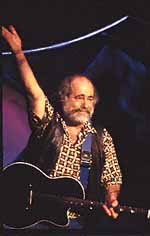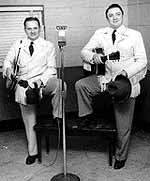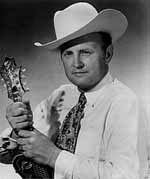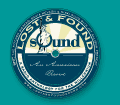Persuading the Dead:
The Persuasions Sing the Grateful Dead
Produced by The Kitchen Sisters (Nikki Silva & Davia Nelson) with Amy Standen.
Mixed by Jim McKee at Earwax Productions in San Francisco
Listen in Real Audio:
14.4 -
28.8 - G2 Sure Stream.
Read excerpts from producer David Gans' studio diary.
Read some observations from executive producer Rip Rense.
View links related to this story.
Back to main story page.

Robert Hunter
Photo by Susanna Millman |
Robert Hunter on the Roots of the Grateful Dead
Robert Hunter has been a part of the Grateful Dead from its inception.
He has contributed lyrics to every one of the band's albums, and the artistry
of his words are an essential part of the Grateful Dead sound. The
latest effort by The Persuasions is no exception: thirteen of the fifteen songs on
the new album Might As Well... have lyrics by Robert Hunter.
When The Kitchen Sisters, Davia Nelson and Nikki Silva, spoke with Robert
Hunter for our Lost & Found Sound story "Persuading the Dead," Hunter talked about the roots
of the Grateful Dead's style, tracing the band's ideas about lyrics and
music back to the folk music of Appalachia, and to bluegrass musicians
like Bill Monroe, Earl Skruggs, and The Stanley Brothers.
Interview Excerpts
"I believe that the sources of the Grateful Dead's music, or at least what I did with Jerry, tend to rely heavily on Appalachian roots. The child ballads of England and Scotland... somehow managed to make it over here to the Appalachians. The music was intact. It became American music. When radio first started happening, they got these old folks in front of the mic who were still playing that absolute raw Appalachian music, and it gradually became the country music. And the bluegrass music also evolved out of those roots.

The Stanley Brothers

Bill Monroe
|
"This is the living root, as I see it, of American popular music.
"What I did -- very much with Jerry's blessing -- was to write our own Appalachian music... I would write lyrics that felt right to me, based on the traditional ideas that I knew, like 'Julie catch a rabbit in the air, get on back where you belong ...' And that sort of stuff comes naturally to me.
"If you can even manage to tell exactly what a song is about, all you do is put that song in a box forever and it loses its evocative power. A song doesn't happen as a whole verse; it happens linearly, line by line, almost word by word, phrase by phrase. And if each phrase, each line, has a proper emotional feel and connects to the line before it and the line after it, the song will be doing what it should be doing. And that's we're looking for. We're not looking to put a coherent short story in someone's head. That's a different craft. It's called prose.
"I walk away from writing what I consider to be a good song - with a good character, a good story in it -- with all I'm gonna really get out of that song. My greatest pleasure is to create it, not to record it, not to hear anyone else play it, though that can be nice too. Or to hear it done in a way I never thought about hearing it -- like the new Persuasions record: that knocks me right out of my seat. I never expected to hear those boys doing my stuff. And it sounds wonderful."
"I'm detecting sort of a sickness at the soul of American music right now People moving to the city, straining the roots, making commercial enterprise out of music that was back porch or played in small halls, shindigs... it'll do it to anything eventually. But if it's solid, as I believe Appalachian roots are, the people will champion them best they can. The music is strong enough, just as long as it's not forgotten."
You need the free RealAudio player to listen to audio files.
Copyright © 2000 The Kitchen Sisters
|

